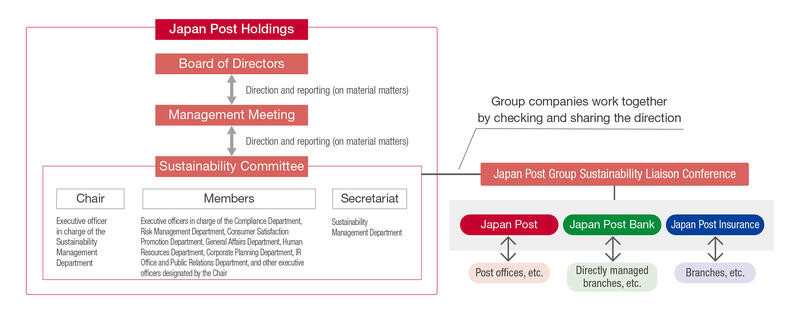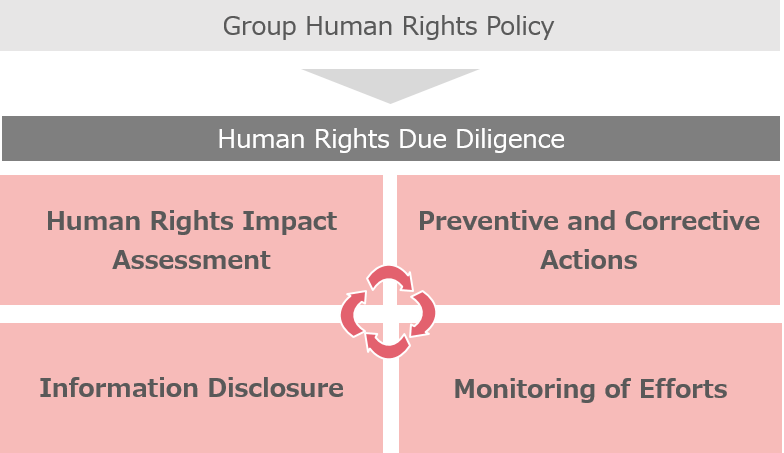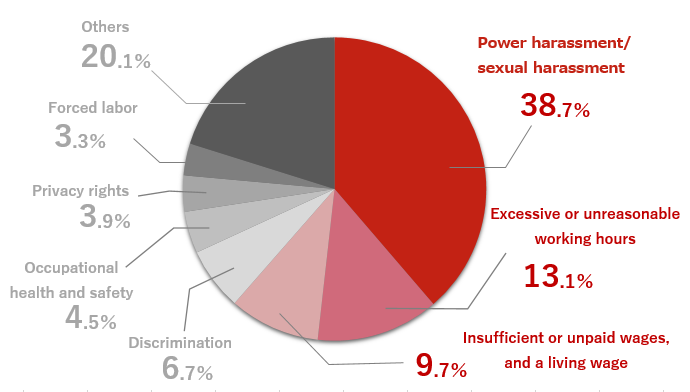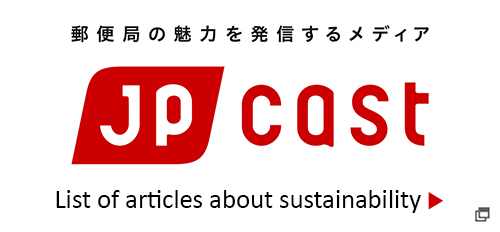- Position:
- Home

- English Home

- JP group Sustainability

- Society

- Respect for Human Rights and Labor
Respect for Human Rights and Labor
Initiatives relating to human rights
Formulation of a human rights policy
Considering the growing social demand for companies to respect human rights, Japan Post Group formulated the Japan Post Group Human Rights Policy in April 2019 based on the United Nations (UN) Guiding Principles on Business and Human Rights and other concepts.
Through this policy, we demonstrate our respect for human rights, and through building a framework for human rights due diligence and identifying negative impacts on human rights, we promote human rights awareness activities to foster a sense of human rights among all employees. We also support the UN Children's Rights and Business Principles and will promote the realization of children's rights. Human rights awareness activities will be reviewed periodically through deliberations by the Sustainability Committee, taking into account changes in corporate activities and the business environment.
The Group's structure for promoting human rights awareness

Dialogue with outside experts
We aim to examine initiatives carefully so that the whole company can understand the importance of sustainability management as viewed by senior management, while considering the importance of business and human rights, taking into account advice from experts, arranging a structure for promoting initiatives, and having a basic concept and policy.
Implementing human rights due diligence
The Japan Post Group undertakes the following human rights due diligence process in order to respect the human rights of persons who are impacted by its business activities.

*Note: In-house seminars on business and human rights are held for all employees of Japan Post Holdings, the Group's holding company, by inviting a lecturer from the Tokyo Legal Affairs Bureau.
Human Rights Impact Assessment
With one of the largest workforces in Japan, the Japan Post Group operates a variety of businesses, including postal services, logistics, banking, and insurance, through about 24,000 post offices nationwide. We identify priority issues by mapping the latent and overt human rights risks associated with our businesses.
In identifying priority issues, we draw on various guidelines and external literature reviews,*1 employee awareness questionnaire on business and human rights,*2 assessment surveys of major subsidiaries,*3 and the expertise of external consultants.
| Stakeholder | Priority issue |
|---|---|
| Employee | Insufficient or unpaid wages; living wage | Excessive or unreasonable working hours |
| Power harassment and sexual harassment | |
| Occupational health and safety | |
| Discrimination (including gender-related human rights issues) | |
| Customer | Privacy rights |
| Consumer safety and right to know | |
| Supplier | Forced labor |
| Child labor | |
| Recipient of investment/financing | Forced labor |
| Child labor | |
| Rights of indigenous people and local residents |
We will manage and review the human rights issues of particular concern to us through monitoring, etc. We will also work to mitigate risks related to human rights issues other than those listed above.
*1 Various guidelines and external literature reviews
-
■Referenced literature:
-
・"Report on the Research and Study on Business and Human Rights (March 2021)." The Ministry of Justice
-
・"Handbook for Management that Respects Human Rights (December 2021)." Keidanren
-
・"Human Rights Issues by Sector v.10 (March 2022)." Caux Round Table Japan (CRT Japan)
-
・"Human Rights Guidance Tool/Services (2014)." UNEP FI
-
・"10 Human Rights Priorities for the Financial Sector (2017)." BSR
-
・"10 Human Rights Priorities for the Transport and Logistics Sector (2017)." BSR
| Human rights issues | UNFPFI (Services) |
BSR (Finance) |
BSR (Transport and logistics) |
CRT (Logistics and transport) |
|---|---|---|---|---|
| (1) Insufficient or unpaid wages; living wage | ✔ | ✔ | ✔ | |
| (2) Excessive or unreasonable working hours | ✔ | ✔ | ✔ | |
| (3) Occupational safety and health | ✔ | ✔ | ||
| (4) Right to social security | ||||
| (5) Power harassment | ||||
| (6) Sexual harassment | ||||
| (7) Maternity/paternity harassment | ||||
| (8) Nursing care harassment | ||||
| (9) Forced labor | ✔ | ✔ | ✔ | |
| (10) Freedom of change of residence | ||||
| (11) Freedom of association | ✔ | |||
| (12) Rights of foreign workers | ✔ | ✔ | ||
| (13) Child labor | ✔ | ✔ | ||
| (14) Human rights issues related to technology and AI | ✔ | ✔ | ||
| (15) Privacy rights | ✔ | ✔ | ||
| (16) Consumer safety and right to know | ✔ | ✔ | ||
| (17) Discrimination | ✔ | ✔ | ✔ | ✔ |
| (18) Gender-related human rights issues | ✔ | ✔ | ✔ | |
| (19) Freedom of expression | ||||
| (20) Rights of indigenous people and local residents | ✔ | ✔ | ||
| (21) Human rights issues related to the environment and climate change | ✔ | ✔ | ||
| (22) Intellectual property rights | ||||
| (23) Bribery and corruption | ✔ | ✔ | ✔ | |
| (24) Human rights issues in the supply chain | ✔ | ✔ | ✔ | |
| (25) Right of access to redress | ✔ | ✔ |
*2 Employee awareness questionnaire on business and human rights (conducted in FY2022)
-
■Target company: Japan Post Holdings
-
■Question:
-
Choose the top three issues that are highly likely to become priority human rights issues in the business activities of the Japan Post Group.
-
(To be chosen from 25 human rights risks listed in the "Report on the Research and Study on Business and Human Rights (March 2021)" by the Ministry of Justice.)
-
■Number of respondents: 965 (Response rate: approx. 90%)

*3 Outline of assessment survey
-
■Target companies:
-
・Japan Post Holdings
-
・Japan Post Co., Ltd.
-
・Japan Post Bank Co., Ltd.
-
・Japan Post Insurance Co., Ltd.
-
■Survey method:
-
I.Identify human rights issues expected in the Group's business areas from external literature, etc.
-
II.For the identified human rights issues, conduct a survey of each company on the occurrence or non-occurrence of the issue and preventive/corrective actions using an interview sheet.
-
III.Integrate the survey results for each company and identify the human rights issues to which the Group should pay particular attention.

Preventive and Corrective Actions
Preventive and Corrective Actions The following shows the implementation of preventive and corrective measures against the negative impact of apparent and latent risks relating to human rights. We will review and enhance activities according to the situation of the assessed impact on human rights.
| Stakeholder | Human rights issues | Main examples of preventive and corrective actions | |
|---|---|---|---|
| Education and training | Internal environment and systems | ||
| Employee | Insufficient or unpaid wages; living wage |
|
|
| Excessive or unreasonable working hours |
|
|
|
| Power harassment and sexual harassment |
|
|
|
| Occupational health and safety |
|
|
|
| Discrimination (including gender-related human rights issues) |
|
|
|
| Customer | Privacy rights |
|
|
| Consumer safety and right to know |
|
|
|
| Supplier | Forced labor |
|
|
| Child labor | |||
| Recipient of investment/financing | Forced labor |
Related disclosures
|
|
| Child labor | |||
| Rights of indigenous people and local residents | |||
| Other |
|
||
Implementation of monitoring of initiatives
The following shows monitoring of the risks related to human rights. We will review monitoring items and methods according to the status shown by the assessment of the impact on human rights.
- Employee and workplace environment surveys
- Human rights and harassment check (twice a year)
- Stress Checks at all business locations (once a year)
- Improvements to workplace environment by inviting employees to give examples of near misses at business locations
- Initiatives to correct excessive overtime
Checking the number of hours of overtime at each department (monthly), monitoring of working hours and others on site (as necessary), managing working hours by checking IC cards (monthly) - Fatigue Checks, encouragement of meetings with industrial physician (for employees with 80 hours or more of overtime per month; monthly)
- Mental disorder detection program (for employees working more than 80 hours of overtime per month and employees who have transferred from outside the company; monthly)
- Exchanging opinions with the labor union
- Holding a subcommittee meeting with the labor union to discuss work-life balance and other matters (once to twice a year)
- Exchanging opinions with the branches of the labor union on such matters as actual overtime hours once every two months
- Holding a subcommittee meeting with the labor union to discuss gender equality and other matters (once to twice a year).
- Supply chain management
- Conducting a survey on CSR procurement to suppliers (once a year)
The Japan Post Group ensures procurement activities engaging in global environment and local community in cooperation with our suppliers based on the Japan Post Group's Approach to Procurement Activity. As in the previous year, we conducted a survey on CSR procurement to our suppliers in 2023 for the purpose of understanding efforts related to CSR of our suppliers and of striving to continuously improve our efforts in whole our supply chain.■Survey overview- Survey period:October 2023 to January 2024
- Number of suppliers surveyed: 217
(Breakdown)
Japan Post Holdings Co., Ltd.: 88
Japan Post Co., Ltd.: 66
Japan Post Bank Co., Ltd.: 50
Japan Post Insurance Co., Ltd.: 13 - *Note: Japan Post Insurance conducts its own supplier survey in addition to the Supplier CSR Questionnaire.
■Sharing of survey results and initiatives for improvement- Feedback of results
The results of the Supplier CSR Questionnaire are shared with all suppliers who responded. - Implementation of monitoring (interviews)
By March 2023, we monitored three companies concerning the results and specific initiatives. We were able to confirm that some action had been taken on some of the issues identified in the questionnaire. For issues that had not been addressed, we showed the companies best practices from other companies and asked them to make improvements. We plan to monitor nine companies by June 2024.
If the survey results identify issues, we do not take immediate action, such as suspending or terminating business, but instead engage in interactive communication with suppliers in the belief that this will lead to improved CSR activities on both sides. Therefore, we plan to continue this initiative.
- Conducting a survey on CSR procurement to suppliers (once a year)
Information Disclosure
Remedial measures
As activities for raising human rights awareness and those for eradicating harassment, the Group tries to develop awareness through varied types of training and listens to employees in connection with compliance overall with a "one-stop consultation and internal platform" and other tools prepared for those needing consultation.
When employees seek advice about or report harassment, we will investigate each case based on their intentions and recognize cases of harassment if applicable. We strictly deal with cases recognized as harassment under the disciplinary action rules prescribed by each Group company. Additionally, we reflect cases in personnel evaluations and/or such measures as personnel transfers, depending on the details.
| Japan Post Group | FY2020 | FY2021 | FY2022 | FY2023 |
|---|---|---|---|---|
| Number of cases of harassment*1 | 134 | 88 | 108 | 124(*2) |
- Number of cases of disciplinary action relating to harassment
- The incidence of harassment was about 0.03% among all employees (about 370,000 in total).
- Coverage: Japan Post Holdings Co., Ltd., Japan Post Co., Ltd., Japan Post Bank Co., Ltd., and Japan Post Insurance Co., Ltd.
Labor initiatives
Realizing a human resource system adaptive to environmental changes
In light of rapid changes in the business environment, the Japan Post Group is reviewing its labor force composition with an eye on future business and responding to laws and regulations related to equal pay for equal work. Regarding employee treatment, we will continue to promote employees from contract worker to full-time employee status, further improve employee treatment, and make efforts to realize a simple and more acceptable salary system.
Initiatives to reduce working hours
The Japan Post Group complies with the laws and regulations relating to the Article 36 agreement and maintains a policy of reducing excessive working hours. Under the policy, we ensure appropriate management of working hours at each workplace and take a variety of initiatives to reduce overtime by increasing business efficiency and reforming the work climate so that all employees can exhibit their capacities to the full and fully enjoy working.
Complying with Industrial Safety and Health Act and related laws and regulations
The Japan Post Group complies with the Industrial Safety and Health Act and related laws and regulations and ensures constant and thorough management and confirmation to prevent violations in existing business operations. We also check compliance with the Industrial Safety and Health Act and the presence of a structure that prevents legal violations when any company is newly formed or M&A takes place.
Increase of wages
To make sure that all people can maintain the minimum standards of wholesome and cultured living as set out in Article 25 of the Constitution of Japan, the Japan Post Group, as its basic policy, complies with labor-related laws and regulations, pays a wage superior to the minimum wage of the region, and pays a fair wage according to jobs such as positions. We also conduct labor-management consultations every year to improve the wage level, including salaries, bonuses, and benefits, so that employees and their families in all regions can lead a richer life. We promise we will make further improvement.
Endorsing "the principle of equal remuneration for men and women workers for work of equal value" in C100 - Equal Remuneration Convention, 1951 (No. 100) of the International Labour Organization, the Japan Post Group maintains standards for paying equal remuneration without sexual discrimination for work of equal value.
Complying with the labor-related laws and regulations
In existing business operations, the Japan Post Group complies with labor-related laws and regulations and ensures the constant management and confirmation to prevent legal violations. We also check compliance with labor-related laws and regulations and the presence of a structure that can prevent legal violations when any new company is set up or M&A takes place.
Labor/management relations
The Japan Post Group respects labor rights (the right to unionize and the right to work in groups for collective bargaining and others) in accordance with the Constitution of Japan and the Labor Union Act.
Within the Japan Post Group, there are labor unions including the Japan Postal Group Union. Collective bargaining is carried out for varied working conditions such as the wages and working hours of employees while equality is ensured between labor and management.
*Note: Number of employees eligible for collective bargaining and agreement (Japan Post Holdings, Japan Post, Japan Post Bank, Japan Post Insurance): Approx. 340,000 (approx. 91.6% of all employees of four companies; as of the end of March 2024)




